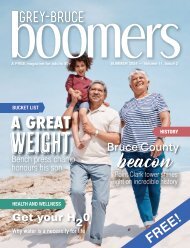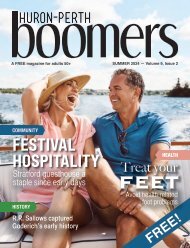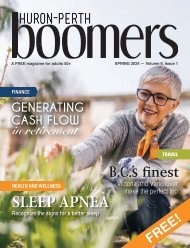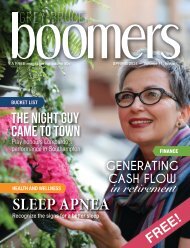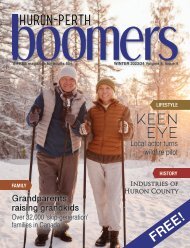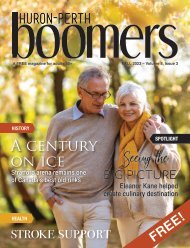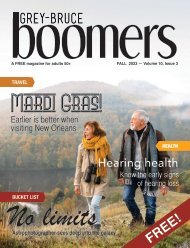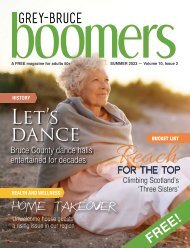Create successful ePaper yourself
Turn your PDF publications into a flip-book with our unique Google optimized e-Paper software.
HEALTH & WELLNESS<br />
Examples of common reasons to see a Geriatrician<br />
include multiple interacting health problems, multiple<br />
hospitalizations or emergency visits, multiple medication<br />
side effects, falls, memory problems, or trouble managing<br />
at home.<br />
Q: You grew up on a farm near Wingham, and<br />
your husband is from the Lucknow area. Why did<br />
you choose to return to the community where you<br />
grew up to practice medicine and raise a family?<br />
A: Growing up in our rural farming community, I have a<br />
unique knowledge of the health care needs and challenges<br />
faced by my friends, neighbours and relatives as they age.<br />
Being a Geriatrician, I need to understand my patients’<br />
context to provide care, so moving home to practice was a<br />
natural fit for me.<br />
Despite the large proportion of persons over age 65,<br />
I was aware of how limited our access to specialized<br />
medical services designed to assess, diagnose, treat, and<br />
rehabilitate older adults and support their caregivers. I<br />
hoped that by moving back, I could provide care to frail<br />
community members, but also catalyze development of<br />
a health system that is supportive of older adults’ care<br />
needs.<br />
In addition to being a Geriatrician, I am also the mother<br />
of two little boys (aged 3 and 1) and my spouse also works<br />
locally The (Bruce Grotto Power). Our families are a tremendous<br />
support to us and we feel lucky to live in such a beautiful<br />
part of Ontario and rejoin our community.<br />
Q: What inspired you to become a Geriatrician,<br />
and why did you choose to practice this specialty<br />
in a rural setting?<br />
A: I had many important experiences that shaped my<br />
career pathway. I have always had a special connection<br />
to my grandparents. Their experiences with the health<br />
care system became the lens for my interaction with my<br />
patients and families. As a high school and university<br />
student, I was lucky enough to find health care jobs<br />
through the Gateway Healthkick summer jobs program.<br />
Many of these jobs were with older adults. I found many<br />
Geriatrician mentors during my medical school and<br />
internal medicine training. I was drawn to the more<br />
holistic approach in geriatric medicine where you balance<br />
best practice with the unique care preferences of older<br />
adults and their families.<br />
Q: What is your definition of ‘rural?’ Do the<br />
small towns of Bruce, Grey, <strong>Huron</strong>, and <strong>Perth</strong><br />
counties qualify, or is it only the outlying areas<br />
(the farming community)?<br />
A: Where a Geriatrician works is determined in many<br />
cases by two factors — available salaried positions, and<br />
by location of provincially funded specialized geriatric<br />
service teams (nurses, nurse practitioners, physiotherapists,<br />
occupational therapists, social workers, pharmacists etc.,<br />
whose positions are funded by the Ministry of Health).<br />
In our region and many others, salaried positions for<br />
Geriatricians are only available in urban areas and team<br />
funding/expertise is largely directed to urban areas.<br />
Many health regions in Ontario are starting to challenge<br />
this model by distributing Geriatricians and teams<br />
throughout their region, to bring care closer to home<br />
for frail people. Because of these challenges, most<br />
Geriatricians are not able to start a solo practice in a rural<br />
area, and the majority are based in tertiary (London) or<br />
secondary care hospitals.<br />
I have several colleagues who work in remote centers<br />
like Thunder Bay and Sudbury, but those are considered<br />
remote urban areas rather than rural. In our regional<br />
there are 10 Geriatricians based in London and one<br />
based in Wingham.<br />
In our region “urban” is often defined as having a<br />
population over 10,000 people and other areas are<br />
defined as rural.<br />
Q: What are some of the unique challenges older<br />
people face in rural environments in comparison<br />
to urban environments?<br />
A: There are several. Home care delivery in rural areas<br />
is an impending health crisis in our area. Some rural<br />
areas have no, or few, nurses or personal support workers<br />
available to provide care in the home. Existing workers<br />
must drive long distances in sometimes poor weather to<br />
provide care to their clients.<br />
In addition, there is a shortage of affordable housing with<br />
FALL <strong>2020</strong> • 23



